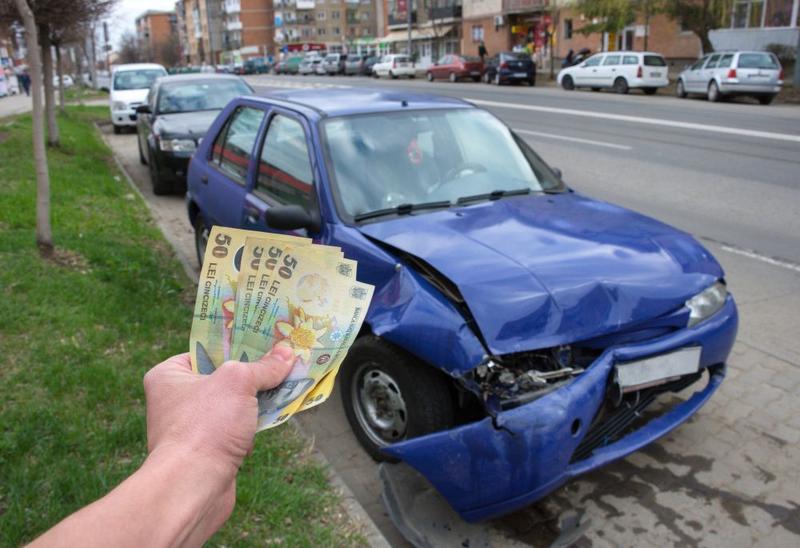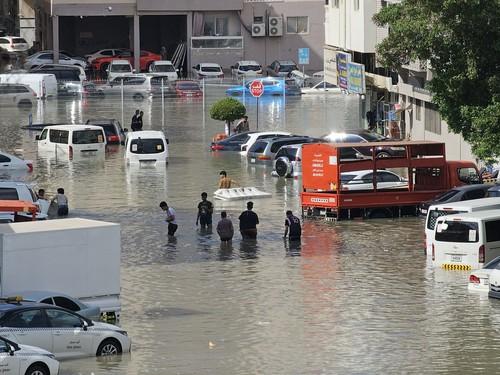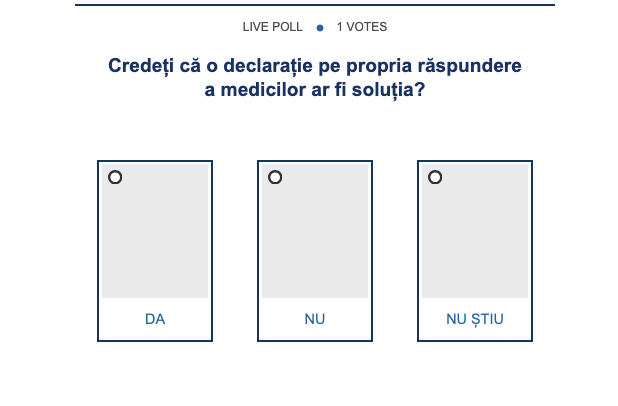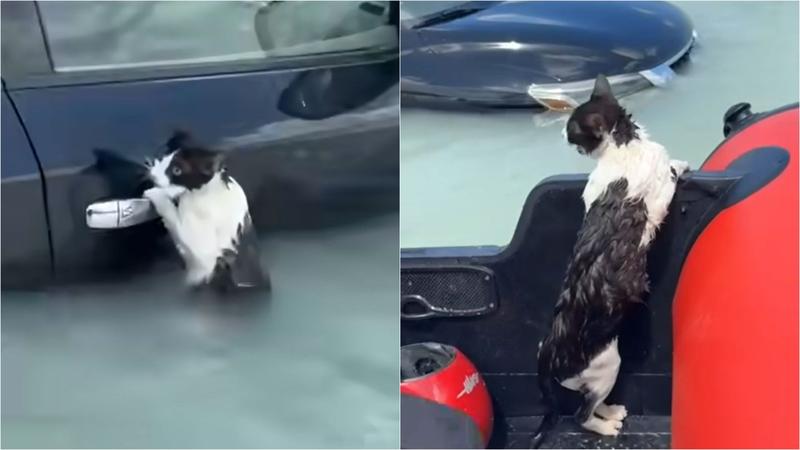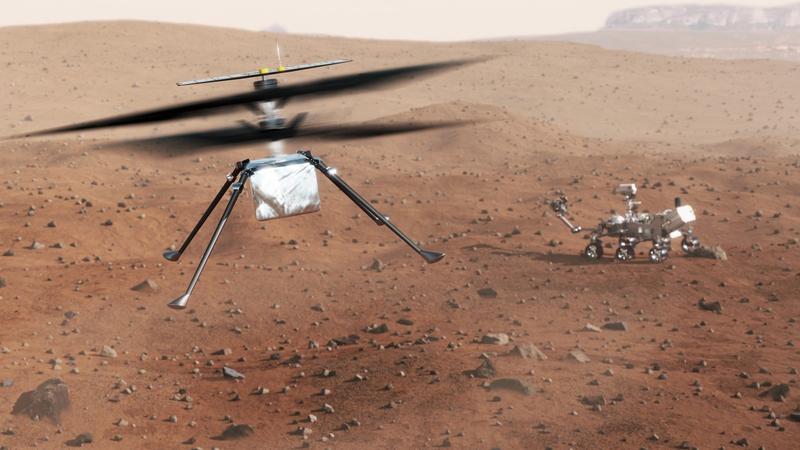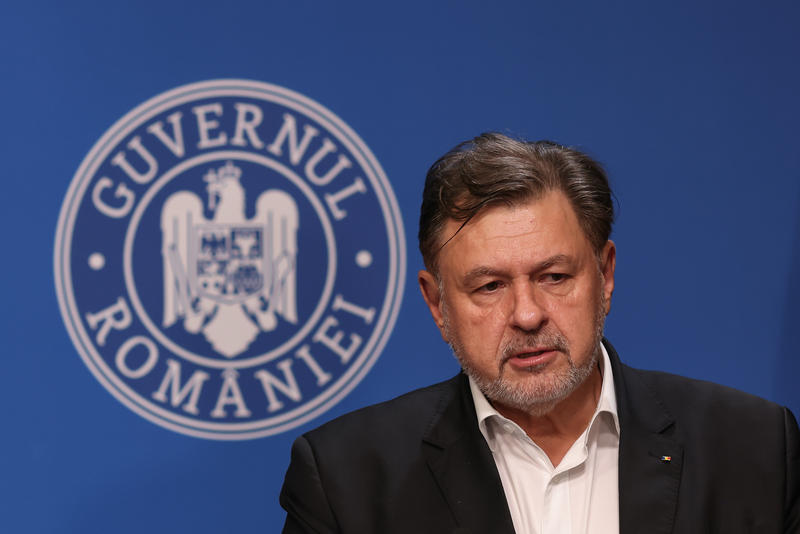Major Romanian energy company Petrom "has to go abroad" in order to secure new reserves and Kazakhstan and Bulgaria are possible targets, OMV CEO and Petrom supervisory council chairman Rainer Seele says in an interview with HotNews.ro. Seele says it makes no sense for Petrom to cooperate with Gazprom when it comes to business or shareholders. Seele lauded the performance of Mariana Gheorghe, who has managed Petrom for the past 12 years. He says new Petrom CEO Christina Verchere Christina Verchere understands especially the development of gas fields and gas projects.
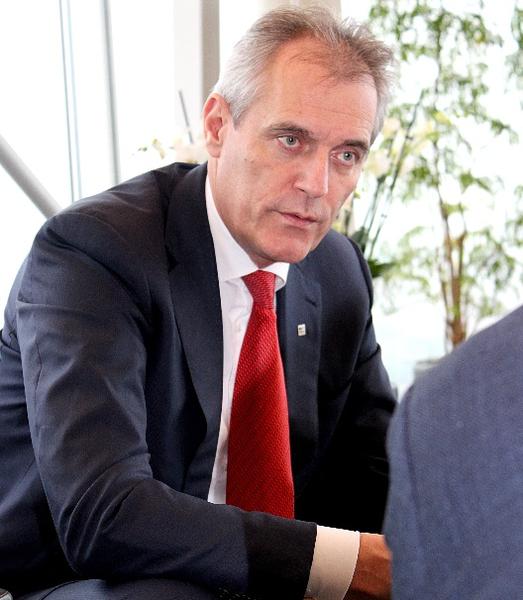
- The OMV boss insisted on the importance of the Black Sea project Neptun, developed together with Exxon, saying a final decision on the investment was expected this year. He also spoke of the need of a stable fiscal framework and announced that gas volumes that wouldn't be absorbed by the domestic market would go for export.
Rep: Let's start with your visit to Romania, at the Presidential Administration. You had an official press release that says you told the president about your strategy to internationalize PETROM's operations. What exactly do you have in mind?
Rainer Seele: First of all, it's the strategy of Petrom which I was explaining to the president. Petrom has two priorities. First, they would like to have a sustainable business continuing in Romania, so our first priority with Petrom is of course the development of the Neptun project. And the second is a further internationalization of Petrom, because we have a track record that the reserve replenishment and the reserve base was weak in the last years and if we would like to have a higher reserve replacement rate. Petrom has to go abroad.
Rep: Do you have any specific countries in mind when you are talking about Petrom going abroad?
Rainer Seele: The Petrom management has to choose. Petrom is already an active player in Kazakhstan. And itis up to the Petrom management to decide which countries abroad they would like to go for. The new incoming CEO is an international experienced manager, having grownn up in the top company BP. And given her background I think she would decide on opportunities in other countries together with her management.
Rep: There were rumors in the market over the past months about Petrom going to Bulgaria, moving further into Kazakhstan or even Russia. Can you confirm that this is the area that Petrom is looking at?
Rainer Seele: Petrom of course is in Kazakhstan and is looking into opportunities in Kazakhstan whether or not they would like to increase the business there. There are also discussions in Bulgaria, but in Bulgaria there are limited opportunities. But if there are opportunities, Petrom of course would look into that. From my point of view, there are no discussions in Petrom management to move to Russia. It would not make sense in my point of view.
Rep: Why would it not make sense, because there is already a partnership between OMV and Russian Gazprom?
Rainer Seele: It makes no sense and we have no interest That Petrom cooperates with Gazprom in Romania. OMV has clearly defined where and how we want to cooperate with Gazprom Romania is not on the map
Rep: Do you think that Petrom should also look at investments abroad in distribution and downstream?
Rainer Seele: This is one of their priorities, of the Petrom management when they introduce their strategy to the supervisory board. They are looking into an integrated business model, which means in case Petrom is going to grow in upstream, they are going to balance their overall portfolio.also in downstream. If there are good opportunities in the market, there are no limitations for the Petrom.
Rep: In the same meeting with the Romanian president, you were quoted in the press release as promising substantial increasing investments starting this year. Is it about investing in Romanian operations or just operations abroad?
Rainer Seele: The concrete figures will be released by the Petrom management. But what I can say is that the Petrom management is planning higher investments in 2018 compared to the previous year in Romania. Which also has to do with the fact that the Neptun project now gets certain maturity. Additional investments are needed after a final investment decision, so that the huge resources of Neptun offshore can be developed.
Rep: Do you also see big investments in downstream as well, in Romania?
Rainer Seele: We have ongoing investments with Petrom in downstream in the refinery. Petrobrazi has huge opportunities left for us for further investments and I think we should keep the opportunities as a big chance for Petrom in the future. But I have to correct you, the main investments are not in offshore,but in existing onshore projects.
Rep: Speaking about Petrom development, abroad or at home, do you have a model in mind when you are thinking about what to do? Do you have a company whose history is inspiring you?
Rainer Seele: The new incoming CEO of Petrom Christina Verchere has to decide how to further develop the company. First of all it is important that internationalization will take place through an upstream venture for Petrom. By this Petrom will improve the reserve base as they have to replenish their production on a more efficient level.
Rep: The same thing as you managed to do here...
Rainer Seele: The same story as OMV, yes.
Rep: Can we also expect Petrom to make some asset swap with other companies, in order to achieve those goals that you are talking about?
Rainer Seele: I don't want to exclude anything for the Petrom management. But in my experience, my business life I can say that swap transactions are much, much more complex, more difficult and consume more time than a normal acquisition. If you have limitations in cash you are going for swap transactions - and this was the main criteria for OMV at the time. Which is not the case for Petrom. If you look at the strong balance sheet of Petrom you will find out that especially the cash position and the financial liquidity in Petrom is very healthy. I would be surprised to see such a move.
Rep: When is Petrom going to decide on Neptun investments?
Rainer Seele: We have to wait for the new incoming CEO, who is going to preparethis decision. What I am expecting is that the Final Investment Decision will be taken within the course of 2018. But it depends, also, on our partner Exxon, who is the operator, who has to make a decision as well. It is not a decision to be made only by Petrom.We have to wait for Exxon´s timing and planning to get all their necessary approvals. We are ready to follow our partner Exxon.
Rep: Probably you'll have to see the fiscal framework.
Rainer Seele: Yes, it is very important to be mentioned, we need to have a stable and reliable framework. The investment we are making in Neptun is calculated for decades, which requires a stable investment framework.
Rep: With your permission, we will return to this issue later. How do you describe the results of the exploration in the Black Sea? I guess you saw the data and you have the eye for it.
Rainer Seele: As we speak, the geology is not the issue. We have a very strong reserve position with Neptun in the Black Sea. There are spots in the neighborhood of the discovery which also look very promising, so there is sustainability, about the geological results we have on the table. So, no concerns about the underground. Our concerns are, of course, on the surface, when the gas comes to the daylight in Romania. There are big volumes coming with the Neptun project. The domestic Romanian market can only absorb and consume a fraction of the gas we are producing. Therefore we are talking about the framework and we are talking about the export options we need to have. The volumes which cannot be consumed by the local Romanian market, will be exported. This is also in the interest of the Romanian economy as it will strengthen the trade balance of the country. Therefore, the export possibility is a must.
Rep: Do you feel like there is a problem with the Romanian state in this regard? Do you sense there are people inside the Romanian state, the political class who don't want to let companies export the gas?
Rainer Seele: No, we have full support from the Romanian government. There are no concerns as we speak. But I think it's fair to say from the very beginning how the nature of the project is: Neputn is clearly also a gas export project . This is also what Ihave said to the President in our meeting: we will guarantee more than enough gas for the Romanian customers. So the Romanian gas market will not have a future that they are going to be short.
Rep: Do you see Romania investing in the physical infrastructure for you and Exxon to export the gas?
Rainer Seele: This is a state project. Transgaz is more than ready to cooperate with all the producers in the country. It's not only Exxon and Petrom, it's also Romgaz who has an interest, that necessary infrastructure is going to be built. We have a very, very good cooperation with Transgaz. They are ready to make necessary investments.
Rep: What about BRUA, the pipeline project backed by the European Comission, is it helpful for your project in the Black Sea?
Rainer Seele: BRUA is an export pipeline and I have already pointed out that we need to have export options for the gas production in Neptun. BRUA is of course important for our projects. It provides the opportunity to export the gas towards the West.
Rep: What do you know about BRUA now, is it following the initial project or its last phase is still in doubt after the decision last year from Hungary? We try to find out what is going on in Romania and we have mixed answers.
Rainer Seele: I also can't give you a very clear picture. There are still a lot of question marks to me. What we have to say is that this pipeline is a cross-border pipeline project. It's not only dependent on Transgaz, who is ready to invest in Romania infrastruce. Also in Hungary the infrastructure has to be available, so that we not have stranded Gas from Neptun on the Romanian/Hungarian border. What I have learned from my business experience is that every transit country has an interest in the business of shipping gas the country, which is a good business model. I am convinced that also Hungary will be an interested partner and invest in necessary infrastructure. This is a project which gives Hungary a much, much bigger importance as a turntable for gas being shipped from the East to the West of Europe.
Rep: Last year, the decision announced by the Hungarian operator was to stop the project. Nobody really understood why. Then, the Hungarian government explained that gas could go to Serbia, to Ukraine and so on. Do you see these markets - Serbia, Ukraine, Turkey or smaller countries in CEE - as interested in the gas as Austria is?
Rainer Seele: In the end, the market will decide.We are going to screen all the different markets. We do not have any preference so far as. Petrom mentioned how to market the gas to any single country. We are now in the process of screening opportunities. If we can supply the markets with competitive terms, then we are going to be successful. At the end of the day, the competition will decide whether or not we are going to sell the gas in different markets.
Rep: Do you have any explanation for the decision announced by the Hungarian operator last year?
Rainer Seele: I cannot give you any kind of interpretation. I am also lacking information. What I have to say is from the very beginning: this pipeline project was claimed to be a project of European interest. Therefore, also the European Commission has to support the project in case one or another member state is trying to block joint initiatives. If it is in the interest of Europe, Brussels also has to take an initiative to support investment activities.
Rep: Returning to Romania, do you know why Mariana Gheorghe gave up one year of her mandate?
Rainer Seele: Mariana Gheorghe decided that she has now a different set of priorities. I accepted her decision and we have an agreement with Mariana Gheroghe in full harmony. Mariana Gheroghe has done an impressively excellent and highly professional job for Petrom. The company which we see today is the result of her successful management.
Rep: How would you describe, in very short, her mandates at Petrom, in terms of what she left at the company?
Rainer Seele: First of all, in terms of economics and the strengths, Mariana Gheorghe is handing over a company which has a very-very-very strong balance-sheet. Financially, it is in extremely good health. She has managed that the company is by-far more efficient than at the time when she took over the helm as a CEO of Petrom. The culture has changed in Petrom. She has engaged herself in changing the corporate culture, which is one of the most difficult task as a CEO. She has managed it very impressively.
Rep: Was she too conservative in terms of expanding Petrom’s operations regionally, because there was this kind of judgement in the market that she, as you mentioned already, she led the company in a very good shape, financially speaking.
Rainer Seele: When I think about the term of Mariana Gheorghe, there is nothing to criticize. Also, the question you asked about the expansion. At her time there was a different strategy needed, different priorities and she has done it perfectly right.
Rep: What made you choose Christina Verchere as the new CEO? What prevailed when you decided? Maybe her previous job as a regional manager, so managing operations in more countries? The Canadian experience, or the crisis-management skills, after the BP oil’s spill? Or all of them?
Rainer Seele: I think you should talk to Christina Verchere and then, you will immediately know that we have chosen a great new CEO for the company. She has a great personality and professional background with very deep knowledge of the industry. She is internationally-experienced, as she grew up in one of the major global oil and gas companies, BP. Christina Verchere understands especially the development of gas fields and gas projects. She is American and our most important partner right now in Romania is Exxon. So she speaks the right language to communicate with our partners in such a project. She is a perfect fit into the corporate culture which was created by Mariana Gheorghe. Iam sure that all colleagues in Petrom will enjoy working with their new CEO.
Rep: How did you manage to make Christina Verchere to leave a big company and choose Petrom, given the short mandate she has here – 1 year.
Rainer Seele: First of all, it was not me who convinced her to leave, it was Petrom itself. How do we have to translate it? Petrom is such an interesting company and it is so magnetic to be the CEO of such a company
The short period of time of the mandate is a formality. Given by the legal framework we have to follow and, as a supervisory board, from my point of view, it’s a formality. That is why I think it is not the remaining time of the mandate which made her decision, it is the the company - the people who are working in the company and especially, the country itself. She told me that she first wants to visit the country and see Bucharest. After her visit she was so impressed about Romania that she has decided not only for Petrom but also for the country.
Rep: You were mentioning the language, the right language to speak to Petrom partner’s Exxon, but it’s also for the first time in Petrom’s history when the CEO is not a Romanian citizen and a Romanian-language speaker. Did the Romanian Government or the Romanian president made such a request during the recruitment process, that the new CEO speaks Romanian?
Rainer Seele: We have to follow the rules and the law in Romania says that the supervisory board has to decide. We started a professional recruiting process. The applicable procedure requires the selection of an entrepreneurial CEO with the right skills and competences. Christina Verchere entirely fulfills all the necessary requirements. If you like a country, if you like Romania like she explained to me, you have an interest to learn the language, to talk to people in their own language. We have to give her time. And you will see the day that you can make an interview with her in Romanian language.
Rep: I’d be glad to. Coming back to the royalties and the fiscal framework. The Romanian Government proposed a draft of royalties few months ago. Is it a fair one, from your point of view?
Rainer Seele: Yes, it is a fair one. We had a very-very constructive dialogue with the authorities, with the Government in Romania. As I already mentioned, we have full support to develop the gas fields. But it has to be written in stone now.
Rep: When do you expect a final vote in the Parliament? Do you have a timeframe?
Rainer Seele: First of all, we have to wait and see how the parliamentary situation in Romania is going to develop. At the moment we have some question marks after the prime-minister decided to step down, I think it was yesterday. We have to wait and see. Of course, we need to have a confirmation, as we would like to take the final-investment decision during the course of 2018. We need to have that certainty from the Romanian Government, but I think it is too early to give you an idea how this would look like.
Rep: Is it a problem for Petrom, for you, this political instability we are seeing in the last years in Romania? Since you took office here in Vienna, Romania changed four prime-ministers and three coalitions.
Rainer Seele: But we managed, with Petrom, isn’t it? And we did that despite what you call instability. I would simply call it changes, the country by itself, was not unstable. The country, the economy has developed excellently. Let me summarize: besides the fact that, we do need political stability, the development of the country was a very good one. Also the development of Petrom was a very good one. So we have to make the clear cut here: although we have seen that, we have managed the business extremely good, the country has developed well. Above all, there’s also one point of stability in your country, and that is President Klaus Iohannis. There has always been this president of the country since I am with OMV. That is why, besides the intensive dialogue with the Government, we also have an ongoing dialogue with the President of Romania.
Rep: That’s interesting. It’s just an anecdotical thing: when you meet him, do you speak German, or English, or Romanian with translators?
Rainer Seele: Well, it’s a great pleasure the President is speaking to me in in my language, German.. I visit him as a guest, and it is a compliment that the President is speaking to me in my own language His language skills are impressive and he speaks German without any accent.
Rep: And my last topic is a very sensitive topic for Romania, and you know this. We know that you have a good business relationship with Gazprom and that you see big – and not only OMV – many big companies see big business opportunities in Russia. On the other hand, for Romania, Russia represents quite the opposite. And you probably know it already. The first question on this topic is if you see Petrom in any kind of businesses with Gazprom or other Russian companies, and I’m not only talking about what we discussed earlier about Petrom going abroad, investing in Russia which doesn’t make sense, of course, but entering any other kind of cooperation with Russian companies, be it Gazprom or another company. A meaningful, a big project, not day-by-day business, of course.
Rainer Seele: No. We love Petrom like a daughter, and we do not share Petrom. As we speak about Romania and Petrom, we have no interest to cooperate with Gazprom in our shareholdings or in our business activities. When we discussed with Gazprom our asset swap there were rumors in the Romanian Press that Petrom might be included in our discussions. Let me be clear: We have never discussed a cooperation with Gazprom in Romania and we have no interest at all to do so.
Rep: Because it doesn’t make sense economically…
Rainer Seele: It makes no sense at all. We have clearly defined where and how we would like to cooperate with Gazprom, and Romania is not on that map.
Rep: The second question related to this topic: given your experience, both as the CEO of a German company, now the CEO of an Austrian company – both companies working with Russian counterparts, how do you see now the EU sanctions imposed to Russia. Are you in favor of relaxing them, or eliminating those sanctions completely, or can you still make business in this political framework?
Rainer Seele: We are, of course, always in full compliance with the sanctions set by the European Union against Russia. Within that framework it was possible for OMV to increase the cooperation with Gazprom. In December last year, we closed our transaction to take over the shares from the German company Uniper in a Russian gas field. Are we going to see limitations? Yes, of course. Maybe not for OMV or for German energy companies so far, but for the industry by itself, yes. What I can see, and I’m now talking as the president of the German-Russian Chamber of Commerce, we got clear feedback from our members that they are heavily criticizing the sanctions. Business opportunities and the trade between Germany and Austria with Russia has been reduced dramatically. Our members in the Chamber are telling me that Russia’s business cooperation is more and more moving towards Asia, especially towards China. As long as we have these sanctions, Europe is losing business towards other competitors. Politicians often say they are ere more concerned about the security than about negative impact on their economies. I think the industry has to accept that politicians have in mind the very important aspect of security. Just in our neighborhood, in the Ukraine, there is a conflict which is just at the front door of Europe. However, I think that also the politicians, as we do in our business, have to rethink whether or not the sanctions are really paying off. So far, I only can see that they would like to have further progress on the Minsk agreement being implemented. It takes clearly two to tango. We are always criticizing Russia, but I think that this is not a black or white situation, and also Ukraine has to increase their effort to implement the Minsk agreement. If this is going to happen, then, politicians also have to send a signal that they are granting progress, that this step is why they reduce the sanctions, if this is really happening. If it’s not happening, the sanctions will stay.

